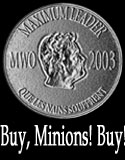Greetings, loyal minions. Your Maximum Leader hopes that some of you are sitting down. You are? Okay… Here it comes…
Your Maximum Leader might (MIGHT) find himself in agreement with some of President Obama’s proposed bank reforms.
There. He said it.
Your Maximum Leader will have to read more about exactly what the President is proposing but it is possible that your Maximum Leader might agree with not only the thrust but detail of the proposals. At this point the reporting on the President’s proposals is mostly limited to how he wants the banks to have to limit risk and not grow as large. There is a lot of breathless reporting about the proposals and few details. So this “endoresment” is tenative and preliminary and easily revoked.
You may be asking yourself, “Self, what has happened to my Maximum Leader? How could he write this?” Well, allow your Maximum Leader to explain some…
As you know your Maximum Leader is a conservative with some libertarian streaks. He believes we need a government which has clearly defined powers and roles. He is a firm believer that the Federal Government has a necessary role to play in the regulation of commerce in our nation. We are not an unfettered capitalist nation. We have limits on our economic system. Many of the limits are very beneficial, some not too beneficial, and some are a hindrance. Your Maximum Leader believes that we do need to do something about our banks…
Now, your Maximum Leader is not an economist, or a finance major, or any such thing. So he admits he’ll need to grow a little more informed on some of these matters as they move forward. But let him explain where he’s coming from. Your Maximum Leader believes that the purpose of finance (and banking) is to concentrate capital to further (advance) other economic activity. Finance (and banking) is not a means to huge profits in and of itself. This is not to say that your Maximum Leader wants to limit bank profits (or paychecks or bonuses). It is to say that the goal of many finance companies (and banks) of late has seemed to be to make a big profit through investments and devices that mgiht not advance other economic activity. So your Maximum Leader is concerned that banks are behaving like regular corporations that focus on the bottom line, and not behaving like banks have behaved through history.
Take for example various mortgage devices that contributed to our current economic situation. The issuance of a mortgage is the proper role of a bank. The reselling of mortgages from bank to bank is not necessarially a bad thing. It is when you start to commoditize mortgages into instruments that become a speculative tool for investors to shift around from institution to institution only seeking a profit on the transfer that you start to have a problem. Again, don’t misunderstand your Maximum Leader here. If you want to speculate in a specialized instrument and expose yourself to risk and potential payout that is fine, but to have the same institutions involved in all aspects of this deal from the mortgage to the speculation is not wise. Your Maximum Leader isn’t fond of the “too big (and diversified) to fail” concept of a bank.
Your Maximum Leader isn’t sure we should go “back to the future” and repeal some of the legislation that allowed commerical banks and investment banks to merge and own other types of companies (like brokerages and insurance companies). But there needs to be some happy median here.
So, your Maximum Leader will try and figure out what the President is proposing and see if he actually can support the reforms. Perhaps our friend FLG will educate us a little on finance and these recent proposals…
Carry on.
UPDATE FROM YOUR MAXIMUM LEADER: Your Maximum Leader just read a piece by Judah Kraushaar in the Wall Street Journal. It touches on some of the concerns that your Maximum Leader has. You can read the whole peice here: Banks Need Clear Capital Rules. Here is the good part:
There is no silver bullet when it comes to the problem of financial institutions that have become too big to fail. Policy makers have determined that the best approach is to force a conservative capital and restructuring regimen on U.S. banks. In this context, President Obama’s proposed tax on bank assets aligns tax policy with the broader direction on capital requirements being pursued by bank regulators. The ideas he outlined yesterday about limiting proprietary trading will further reduce risk taking and will likely come at the expense of profitability.
There is nothing wrong with increasing capital requirements for the banks. Attacking excessive leverage in the banking system may go a long way toward dampening the boom-bust cycle that has become alarmingly intense in recent decades.
What we need now is clarity. What will future capital requirements look like? What is the plan to return the banks to reasonable rates of profitability? Until that architecture is put in place, banks will have little incentive to sell the problem assets currently clogging their balance sheetsâ€â€let alone to lend more aggressively.
Protracted congressional hearings on the bank crisis, piecemeal new regulations, sporadic attacks on bank compensation, and an ad hoc approach to taxing banks will only compound the crisis in the American financial service industry.
Right now, investors lack conviction in the ability of the banks to move past the crisis and get back to generating profits. The stocks of the largest bank holding companies now commonly trade at a discount to book value. These discounts illustrate that investors doubt the companies’ wherewithal to earn future returns in excess of their cost of capital. Few financial companies can survive with that sort of penalty, given that attracting fresh capital is their lifeblood.
This isn’t the only concern your Maximum Leader was trying to address, but it is part of the big picture.
Carry on.



